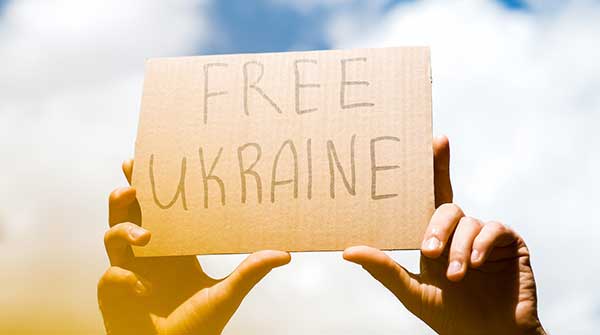Liberal democracies have a common interest in supporting Ukraine in its fight against Putin and Russian aggression
 The decision last week by the majority of U.S. members of Congress and senators to continue to fund Ukraine’s efforts to defend itself – $300 million in security assistance for Ukraine authorized by the House of Representatives – was a welcome reminder that despite increasing isolationist noise from some American lawmakers, most see support for Ukraine as in the interest of their country, and the West more generally.
The decision last week by the majority of U.S. members of Congress and senators to continue to fund Ukraine’s efforts to defend itself – $300 million in security assistance for Ukraine authorized by the House of Representatives – was a welcome reminder that despite increasing isolationist noise from some American lawmakers, most see support for Ukraine as in the interest of their country, and the West more generally.
That $300 million was part of the annual defense appropriation but Representatives Marjorie Taylor Greene and Matt Gaetz both proposed amendments to remove this funding. Greene’s amendment lost 341 t,o 89 while Gaetz’s failed by 358 to 70, with a majority in both parties opposing such 1930s-style neo-isolationism.
To grasp why isolationist sentiments are increasing, consider three common reasons given for opposing Western (including American, Canadian, and European) aid to Ukraine: Russia’s historical claim to Ukraine, past promises made by NATO and the United States, and concerns about Ukrainian corruption.
Russian President Vladimir Putin often claims that Ukraine is not a legitimate country but rather part of Russia. However, this claim is unfounded. Since the introduction of Christianity in 988, Kyiv has been the spiritual capital of Rus. While Ukraine was later conquered by Catherine the Great, such historical conquests cannot serve as a basis for the current international order. In 1991, when the Soviet Union collapsed, Ukraine became an independent country with its territorial integrity guaranteed by the United States, the United Kingdom, and Russia itself through the 1994 Budapest Memorandum. It is crucial to honour this commitment.
Putin’s claim for the invasion, that NATO’s eastward expansion is aggressive and threatens Russia’s borders, does not make sense unless Russia has no intention of living in peace with its neighbours. For instance, living next to a democracy like Poland or the Baltic Republics should not pose a threat to Russia. In fact, historical evidence shows that the aggression has primarily come from the Soviet Union. The Soviet Union invaded Poland in 1939 as part of the secret Molotov-Ribbentrop pact with Nazi Germany, which divided Poland between the two totalitarian regimes. The Soviet Union also invaded and annexed the Baltic Republics (Estonia, Latvia, and Lithuania) in 1940.
Furthermore, Putin’s claim that there was a written or tacit agreement in 1989 not to expand NATO eastward has been denied by then-U.S. Secretary of State James Baker and then-Russian President Mikhail Gorbachev.
In terms of Ukrainian corruption, the current government has made significant efforts to combat it since the 2013 Maidan Uprising and the removal of pro-Russian oligarch Viktor Yanuvkoyvch. Ukrainian President Volodymyr Zelensky even fired numerous senior government officials last January, amid the ongoing war, to address corruption.
Throughout his time in power, Putin has sought to regain influence over the foreign policies of former Soviet states, including their weaponry. Putin’s goal is not to restore the Soviet Union but to unite the Slavic peoples of Europe under Russian control. This vision has been fueled by ideologues like Aleksandr Dugin, a Russian ultranationalist and political theorist who promotes fascist ideas inspired by Martin Heidegger’s commitment to the Third Reich. Putin’s endorsement of Dugin’s ideology and its influence explains why Putin’s claim that Volodymyr Zelensky, who is Jewish, leads a fascist regime is not only factually incorrect but actually the opposite is true: the fascist elements reside in Dugin’s ideology and Putin’s rhetoric.
If Putin is not expelled from Ukraine, he will likely pose a threat to other democracies as well. This is why liberal democracies have a shared interest in supporting Ukraine’s war effort.
Unfortunately, the commitment to supporting Ukraine is not as strong as it once was in Western democracies, the U.S. included. This is why the neo-isolationists, although a minority in the Republican Party, have abandoned Ronald Reagan’s policy of defending and supporting freedom domestically and abroad. Some isolationists, like American journalist Mollie Hemingway, advocate for avoiding foreign entanglements, a stance with historical roots in the positions of George Washington and Thomas Jefferson. Others, like Tucker Carlson, even endorse Putin’s false historical claims to justify his invasions.
Despite these challenges, there is a bright spot in all this. Despotic leaders often initiate wars but often find themselves crippled by them. Russia experienced this in the Russo-Japanese War in 1905 and the Soviet invasion of Afghanistan in 1979. More recently, Yevgeny Prighozin’s near-coup, which resulted from Putin’s aggression in Ukraine, demonstrated that such actions can backfire domestically.
Moreover, while Putin’s invasion was supposedly aimed at halting NATO’s expansion, NATO has actually added new members along Russia’s borders. Therefore, Putin has unintentionally thwarted his own objectives. Nevertheless, he must be expelled from his remaining hold in eastern Ukraine.
Once Ukraine is free from Putin’s threat, it will have a promising future, and its values should be endorsed by liberals, conservatives, and libertarians alike.
Waller Newell is Professor of Political Science and Philosophy at Carleton University and a Senior Fellow at the Aristotle Foundation for Public Policy. His newest book is Tyranny and Revolution: Rousseau to Heidegger.
For interview requests, click here.
The opinions expressed by our columnists and contributors are theirs alone and do not inherently or expressly reflect the views of our publication.
© Troy Media
Troy Media is an editorial content provider to media outlets and its own hosted community news outlets across Canada.


